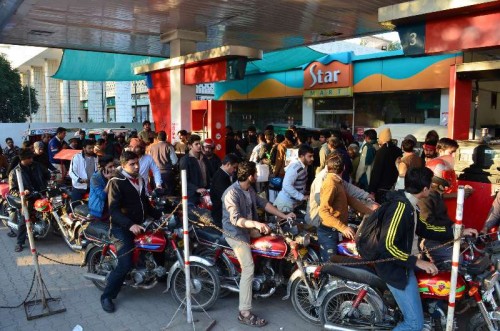
Pakistan has a new crisis: widespread fuel shortages that have raised tempers all across the country and forced Prime Minister Nawaz Sharif to sack top officials.
Newspapers have reported scuffles at fuel stations in major cities as hundreds of cars and two-wheelers lined up for petrol and diesel – only to be told that none was available.
The Dawn said many motorists in cities such as Lahore, Faislabad, Islamabad, Sialkot and Multan spent the night queuing up at the handful of petrol pumps still open.
A fuming Sharif, on his return from Saudi Arabia Saturday after a two-day visit, sacked four officials including Petroleum Secretary Abid Saeed, his deputy Naeem Malik and Pakistan State Oil chief Amjad Janjua.
Petroleum Minister Shahid Khaqan Abbasi, however, kept his job, apparently because of his closeness to Sharif.
Newspapers reported that the prime minister had directed provincial governments to check black-marketing of petrol. It was decided to expedite the supply and delivery of petrol.
The Daily Times quoted Interior Minister Chaudhry Nisar Ali Khan as admitting that the government failed to anticipate the fuel crisis. He said he was ashamed to see long queues of cars at petrol stations.
The crisis began about a week ago — amid the winter chill.
“As of now, public has to run from one filling station to another in search of petrol in many areas of the country,” the Daily Times said. “If available, it is being sold on exorbitant prices.
“The dealers and petrol pumps owners are taking full advantage of the situation in the absence of effective government checks,” it said.
Petroleum and Natural Resources Minister Shahid Khaqan Abbasi has said that compressed natural gas (CNG) stations would reopen in Lahore in a bid to meet the fuel shortage.
According to newspapers, a large number of filling stations have remained shut for six long days after exhausting their stock.
Prime Minister Sharif Sunday ordered an inquiry into the crisis.
A frustrated Pakistani was quoted as saying: “Had to take brother to hospital at 3 a.m.. No petrol in car, begged for few drops… got some in black eventually.”
In Multan, angry residents staged street protests, the media said.
The Dawn said the shortages had affected emergency healthcare services. Public transport has also been hit hard.
Dawn News quoted economist Shahid Hassan Siddiqui as saying that “poor governance, incompetence and corruption” were to blame for the mess, not the international fuel prices.
The crisis has brought down electricity generation by over 2,000 MW, the media said, raising the deficit to 7,000 MW.
More power plants were likely to suspend work soon, the Dawn said.
Opposition leader Imran Khan has slammed the government.
“This government is worse than the PPP’s,” he said. “In the PPP tenure, oil prices were twice as compared to now but even then never ever did this kind of worst fuel shortage take place.”
Officials claimed that the crisis was set to end as 50,000 tonnes of crude had reached Karachi from the Middle East.
The Dawn said in an editorial: “The crisis is the result of the heavy centralization of all decision-making in the hands of a very small number of individuals, which is the hallmark of this government’s style.”